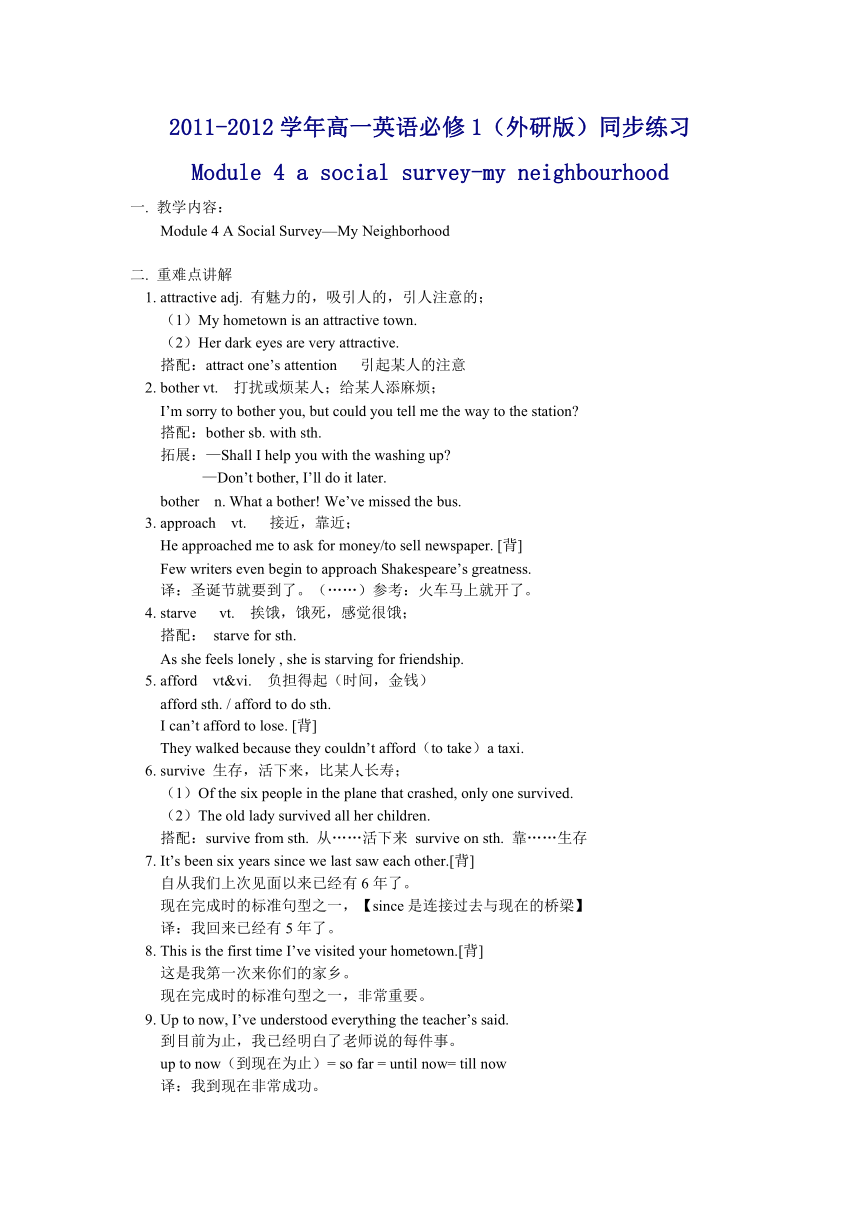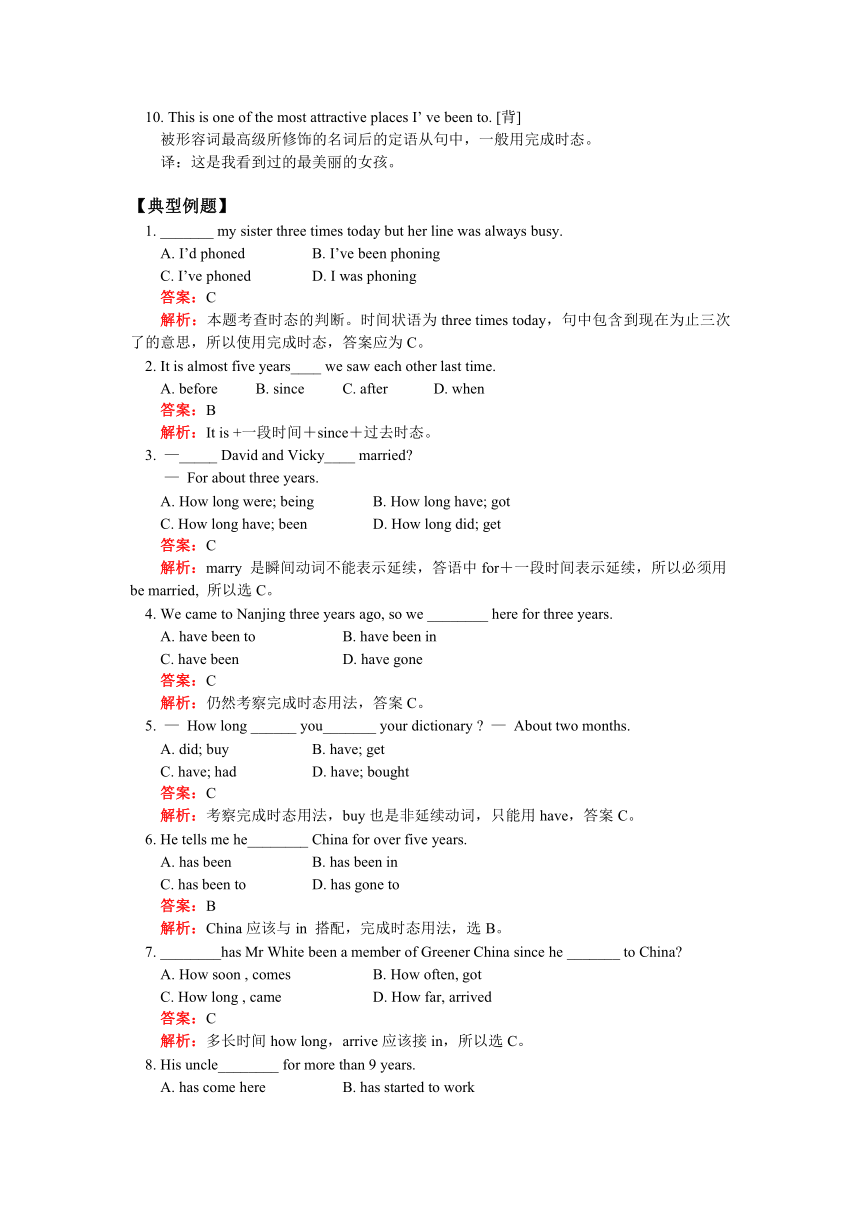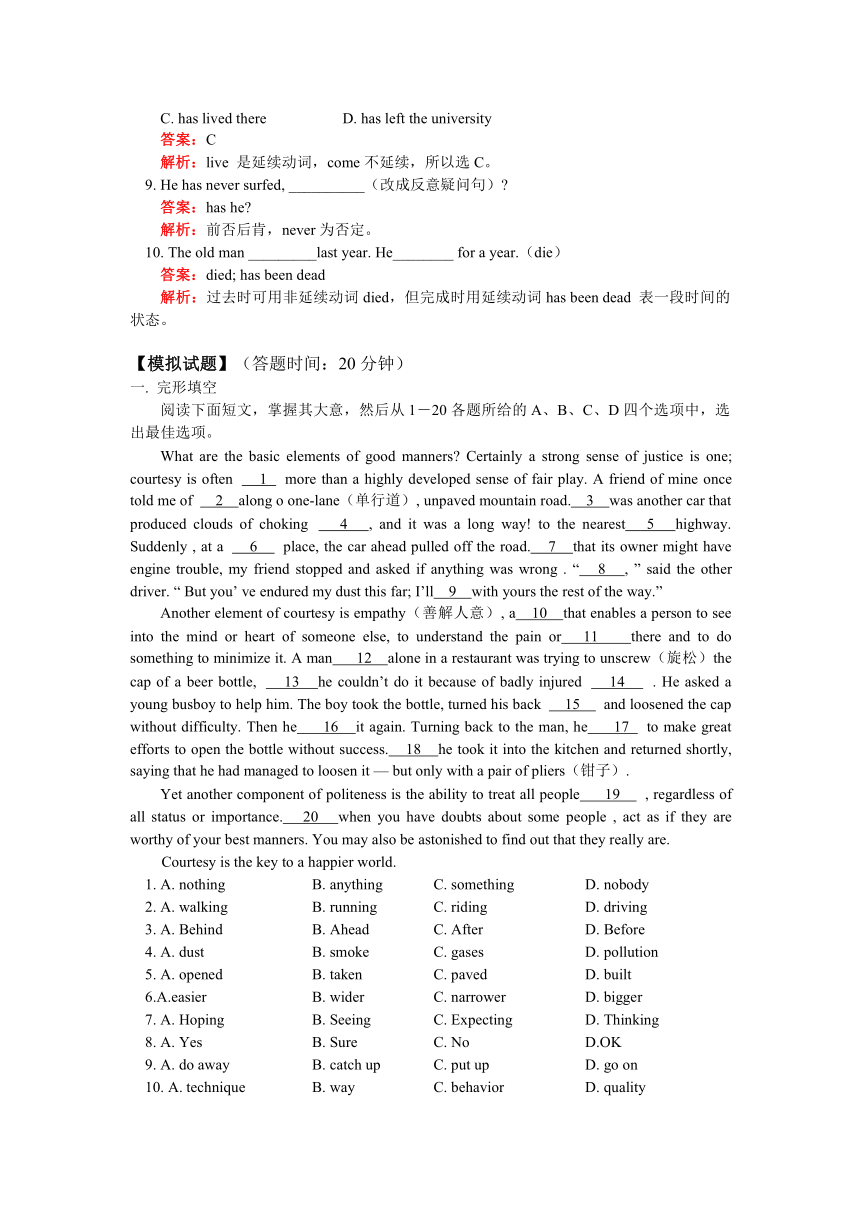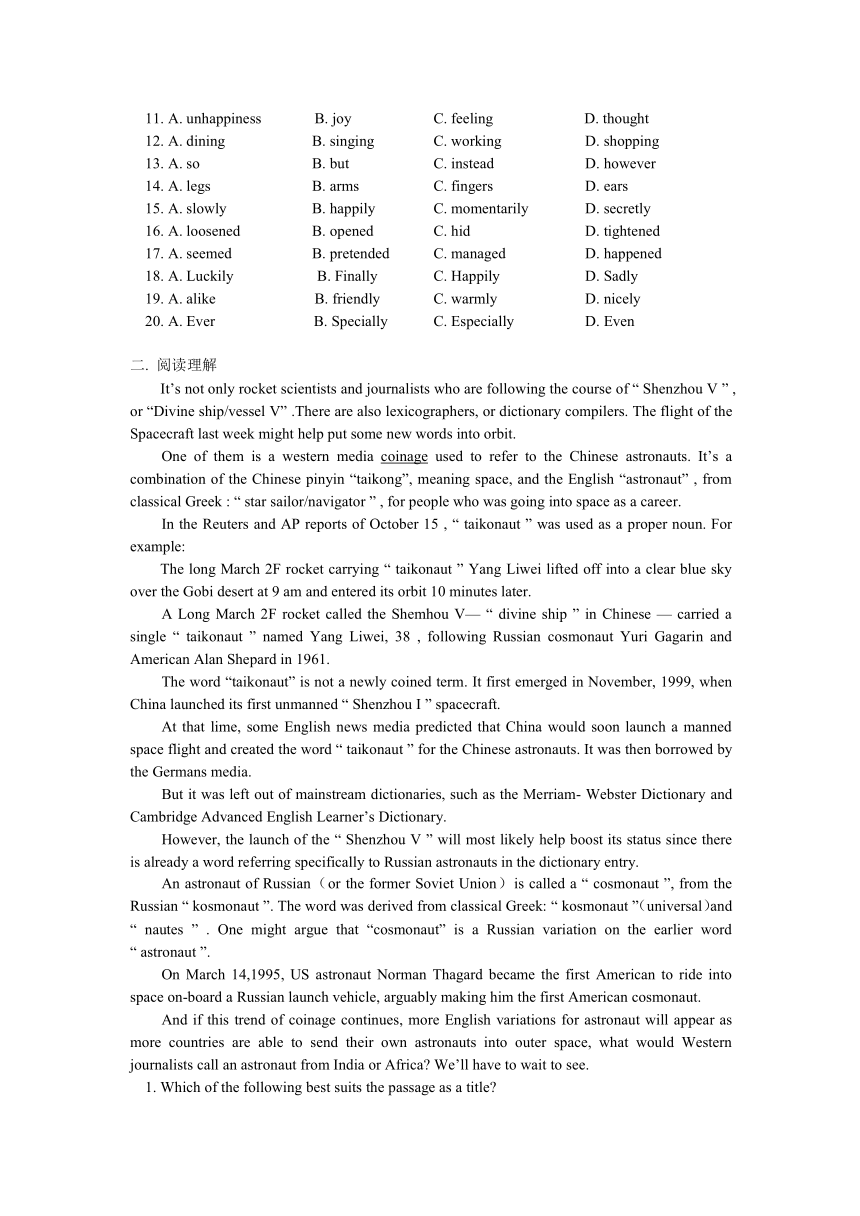2011高一英语同步练习:Module 4 a social survey-my neighbourhood(外研必修1)
文档属性
| 名称 | 2011高一英语同步练习:Module 4 a social survey-my neighbourhood(外研必修1) |

|
|
| 格式 | zip | ||
| 文件大小 | 26.4KB | ||
| 资源类型 | 教案 | ||
| 版本资源 | 外研版 | ||
| 科目 | 英语 | ||
| 更新时间 | 2012-01-24 00:00:00 | ||
图片预览




文档简介
2011-2012学年高一英语必修1(外研版)同步练习
Module 4 a social survey-my neighbourhood
一. 教学内容:
Module 4 A Social Survey—My Neighborhood
二. 重难点讲解
1. attractive adj. 有魅力的,吸引人的,引人注意的;
(1)My hometown is an attractive town.
(2)Her dark eyes are very attractive.
搭配:attract one’s attention 引起某人的注意
2. bother vt. 打扰或烦某人;给某人添麻烦;
I’m sorry to bother you, but could you tell me the way to the station
搭配:bother sb. with sth.
拓展:—Shall I help you with the washing up
—Don’t bother, I’ll do it later.
bother n. What a bother! We’ve missed the bus.
3. approach vt. 接近,靠近;
He approached me to ask for money/to sell newspaper. [背]
Few writers even begin to approach Shakespeare’s greatness.
译:圣诞节就要到了。(……)参考:火车马上就开了。
4. starve vt. 挨饿,饿死,感觉很饿;
搭配: starve for sth.
As she feels lonely , she is starving for friendship.
5. afford vt&vi. 负担得起(时间,金钱)
afford sth. / afford to do sth.
I can’t afford to lose. [背]
They walked because they couldn’t afford(to take)a taxi.
6. survive 生存,活下来,比某人长寿;
(1)Of the six people in the plane that crashed, only one survived.
(2)The old lady survived all her children.
搭配:survive from sth. 从……活下来 survive on sth. 靠……生存
7. It’s been six years since we last saw each other.[背]
自从我们上次见面以来已经有6年了。
现在完成时的标准句型之一,【since是连接过去与现在的桥梁】
译:我回来已经有5年了。
8. This is the first time I’ve visited your hometown.[背]
这是我第一次来你们的家乡。
现在完成时的标准句型之一,非常重要。
9. Up to now, I’ve understood everything the teacher’s said.
到目前为止,我已经明白了老师说的每件事。
up to now(到现在为止)= so far = until now= till now
译:我到现在非常成功。
10. This is one of the most attractive places I’ ve been to. [背]
被形容词最高级所修饰的名词后的定语从句中,一般用完成时态。
译:这是我看到过的最美丽的女孩。
【典型例题】
1. _______ my sister three times today but her line was always busy.
A. I’d phoned B. I’ve been phoning
C. I’ve phoned D. I was phoning
答案:C
解析:本题考查时态的判断。时间状语为three times today,句中包含到现在为止三次了的意思,所以使用完成时态,答案应为C。
2. It is almost five years____ we saw each other last time.
A. before B. since C. after D. when
答案:B
解析:It is +一段时间+since+过去时态。
3. —_____ David and Vicky____ married
— For about three years.
A. How long were; being B. How long have; got
C. How long have; been D. How long did; get
答案:C
解析:marry 是瞬间动词不能表示延续,答语中for+一段时间表示延续,所以必须用be married, 所以选C。
4. We came to Nanjing three years ago, so we ________ here for three years.
A. have been to B. have been in
C. have been D. have gone
答案:C
解析:仍然考察完成时态用法,答案C。
5. — How long ______ you_______ your dictionary — About two months.
A. did; buy B. have; get
C. have; had D. have; bought
答案:C
解析:考察完成时态用法,buy也是非延续动词,只能用have,答案C。
6. He tells me he________ China for over five years.
A. has been B. has been in
C. has been to D. has gone to
答案:B
解析:China应该与in 搭配,完成时态用法,选B。
7. ________has Mr White been a member of Greener China since he _______ to China
A. How soon , comes B. How often, got
C. How long , came D. How far, arrived
答案:C
解析:多长时间how long,arrive应该接in,所以选C。
8. His uncle________ for more than 9 years.
A. has come here B. has started to work
C. has lived there D. has left the university
答案:C
解析:live 是延续动词,come不延续,所以选C。
9. He has never surfed, __________(改成反意疑问句)
答案:has he
解析:前否后肯,never为否定。
10. The old man _________last year. He________ for a year.(die)
答案:died; has been dead
解析:过去时可用非延续动词died,但完成时用延续动词has been dead 表一段时间的状态。
【模拟试题】(答题时间:20分钟)
一. 完形填空
阅读下面短文,掌握其大意,然后从1-20各题所给的A、B、C、D四个选项中,选出最佳选项。
What are the basic elements of good manners Certainly a strong sense of justice is one; courtesy is often 1 more than a highly developed sense of fair play. A friend of mine once told me of 2 along o one-lane(单行道), unpaved mountain road. 3 was another car that produced clouds of choking 4 , and it was a long way! to the nearest 5 highway. Suddenly , at a 6 place, the car ahead pulled off the road. 7 that its owner might have engine trouble, my friend stopped and asked if anything was wrong . “ 8 , ” said the other driver. “ But you’ ve endured my dust this far; I’ll 9 with yours the rest of the way.”
Another element of courtesy is empathy(善解人意), a 10 that enables a person to see into the mind or heart of someone else, to understand the pain or 11 there and to do something to minimize it. A man 12 alone in a restaurant was trying to unscrew(旋松)the cap of a beer bottle, 13 he couldn’t do it because of badly injured 14 . He asked a young busboy to help him. The boy took the bottle, turned his back 15 and loosened the cap without difficulty. Then he 16 it again. Turning back to the man, he 17 to make great efforts to open the bottle without success. 18 he took it into the kitchen and returned shortly, saying that he had managed to loosen it — but only with a pair of pliers(钳子).
Yet another component of politeness is the ability to treat all people 19 , regardless of all status or importance. 20 when you have doubts about some people , act as if they are worthy of your best manners. You may also be astonished to find out that they really are.
Courtesy is the key to a happier world.
1. A. nothing B. anything C. something D. nobody
2. A. walking B. running C. riding D. driving
3. A. Behind B. Ahead C. After D. Before
4. A. dust B. smoke C. gases D. pollution
5. A. opened B. taken C. paved D. built
6.A.easier B. wider C. narrower D. bigger
7. A. Hoping B. Seeing C. Expecting D. Thinking
8. A. Yes B. Sure C. No D.OK
9. A. do away B. catch up C. put up D. go on
10. A. technique B. way C. behavior D. quality
11. A. unhappiness B. joy C. feeling D. thought
12. A. dining B. singing C. working D. shopping
13. A. so B. but C. instead D. however
14. A. legs B. arms C. fingers D. ears
15. A. slowly B. happily C. momentarily D. secretly
16. A. loosened B. opened C. hid D. tightened
17. A. seemed B. pretended C. managed D. happened
18. A. Luckily B. Finally C. Happily D. Sadly
19. A. alike B. friendly C. warmly D. nicely
20. A. Ever B. Specially C. Especially D. Even
二. 阅读理解
It’s not only rocket scientists and journalists who are following the course of “ Shenzhou V ” , or “Divine ship/vessel V” .There are also lexicographers, or dictionary compilers. The flight of the Spacecraft last week might help put some new words into orbit.
One of them is a western media coinage used to refer to the Chinese astronauts. It’s a combination of the Chinese pinyin “taikong”, meaning space, and the English “astronaut” , from classical Greek : “ star sailor/navigator ” , for people who was going into space as a career.
In the Reuters and AP reports of October 15 , “ taikonaut ” was used as a proper noun. For example:
The long March 2F rocket carrying “ taikonaut ” Yang Liwei lifted off into a clear blue sky over the Gobi desert at 9 am and entered its orbit 10 minutes later.
A Long March 2F rocket called the Shemhou V— “ divine ship ” in Chinese — carried a single “ taikonaut ” named Yang Liwei, 38 , following Russian cosmonaut Yuri Gagarin and American Alan Shepard in 1961.
The word “taikonaut” is not a newly coined term. It first emerged in November, 1999, when China launched its first unmanned “ Shenzhou I ” spacecraft.
At that lime, some English news media predicted that China would soon launch a manned space flight and created the word “ taikonaut ” for the Chinese astronauts. It was then borrowed by the Germans media.
But it was left out of mainstream dictionaries, such as the Merriam- Webster Dictionary and Cambridge Advanced English Learner’s Dictionary.
However, the launch of the “ Shenzhou V ” will most likely help boost its status since there is already a word referring specifically to Russian astronauts in the dictionary entry.
An astronaut of Russian(or the former Soviet Union)is called a “ cosmonaut ”, from the Russian “ kosmonaut ”. The word was derived from classical Greek: “ kosmonaut ”(universal)and “ nautes ” . One might argue that “cosmonaut” is a Russian variation on the earlier word “ astronaut ”.
On March 14,1995, US astronaut Norman Thagard became the first American to ride into space on-board a Russian launch vehicle, arguably making him the first American cosmonaut.
And if this trend of coinage continues, more English variations for astronaut will appear as more countries are able to send their own astronauts into outer space, what would Western journalists call an astronaut from India or Africa We’ll have to wait to see.
1. Which of the following best suits the passage as a title
A. Why to Create the Word “Astronaut ”
B. Why to Make a Lot of Variations for “ Taikonaut ”
C. How to Tell a “ Taikonaut ” from an Astronaut
D. How to Call Astronauts from Different Countries
2. Which is the right statement in the following sentence
A. The word “ taikonaut ” was born with the launch of “ Shenzhou V ” spacecraft.
B. Yang Liwei, Yuri Gagarin and Alan Shepard are all excellent taikonauts.
C. The American newspapers such as Reuters coined the word “ taikonaut ”.
D. Some new words have widely been put into use with the launch of the “ Shenzhou V ” spacecraft.
3. From the writer’s point of view,______.
A. lexicographers or dictionary compilers have also done a lot of things to help launch “ Shenzhou V ”
B. the American astronaut Norman Thagard is not a cosmonaut
C. the words coined or to be coined for astronauts of different countries usually have something to do with the name(s)of their countries
D. the reason why there will be more variations for the word astronauts is that more and more countries will be able to send their own astronauts into space
4. What does the underlined word “coinage ” mean in the passage
A. System of coins in use.
B. Invention of word.
C. New meaning of a word.
D. Discovery of an old word.
三. 短文改错
During this summer holiday I took part in special 1. ______
summer camp with some of my classmates. Where we 2. ______
made some new friends who were senior students from 3. ______
Canvey , a town in the Thames, lying to the east of London. 4. _______
as hosts, we showed them round many places of interests 5. ______
in Beijing, such the Palace Museum, the Great Wall and 6. _______
the Summer Palace and we tell them about the changes 7. ________
which have been taken place in Beijing. They said that 8. ________
Bejing was quite different with what they had heard of and 9. _______
it was as beautifully as Canvey. I think the summer camp 10. _______
is of great value.
【试题答案】
一.
1. A nothing more than相当于only,“只不过”之意。
2. D 后面的the other driver暗示我们,作者的朋友也是一位司机,他当时正开车行驶在一条没有铺柏油的单行山道上。
3. B 另一辆车应并在前面,从后面的the car ahead可以找到答案。Before不能用作副词,表示空间关系。
4. A 前一辆车扬起了很多灰尘。本段末有提示。
5. C 作者朋友的车现在正开在灰尘滚滚的没有铺柏油的山路上,所以可以推测,要开到最近的铺好了柏油的公路上还有一段很长的距离。paved与前面的unpaved对应,比较符合语境。
6. B 根据常识判断,汽车开在路边停下来,一般是停在比较宽的地方。
7. D 这里描述了作者朋友当时的想法(内心的一种猜测),故用Thinking。他认为那部汽车的发动机出了毛病。
8. C 从后面的But可以判断,汽车并没有什么毛病。
9. C 在余下的路程中,另一辆车的司机要求作者朋友的车开在前面,而他自己的车开在后面,忍受吃灰之苦。put up with是“忍受”之意符合语境。而do away with(废除),catch up with(赶上),go on with(继续)与句意不合。
10. D empty是个人所具有的品质和能力,而不是一种行为(behavior),方法(way)或技术(technique)。
11. A or暗示,填空处应选用pain的近义词,作同位语,而只有unhappiness符合这个要求。
12. A 按常识判断,在饭店里应该是在吃饭。
13. B 意义转折。
14. C 拧不开酒瓶盖,说明受伤的部位应该是手指头。
15. C momentarily表示“一会儿,片刻”之意。他转过身有一会儿时间(目的是不让这个顾客看见他轻而易举地旋开了酒瓶盖),其它选项不符合句意。
16. D 他这时又把旋松的瓶盖拧紧。
17. B 他假装费了很大的劲却没有旋开瓶盖。
18. B 作者是按事情发生的先后顺序来写的,这时已是故事的尾声,故用finally。
19. A alike在这里是副词,“相同地”意思。礼貌的另一个要素是要平等地对待每一个人,不管他的地位多高,多么重要。
20. D 这里要选用程度状语来修饰,且含有转折的意思。故用Even。
二.
1. C 主旨大意题。本文主要介绍了因为中国载人航天事业的发展而派生的一个新英语词汇“taikonaut”的由来。故C最佳。
2. D 细节题。根据The flight of the Spacecraft last week might help put some new words into orbit可知,随着“神舟5号”的发射升空,可能会诞生更多的新词汇。
3. D 细节题。根据more English variations for “astronaut” will appear,as more countries are able to send their own astronauts into outer space可知,astronauts之所以有这么多的派生词,是因为越来越多的国家能把自己国家的宇航员送上太空。故D项正确。
4. B 词义猜测题。我们可以通过它的派生词coined来帮助我们推测词义。文中有句话The word “ taikonaut ” is not a newly coined term。由知可知coinage是“新创词汇”的意思。
三.
1. special前加a。camp是可数名词的单数形式,需用不定冠词修饰。
2. Where改为There此句不是定语从句。
3. 正确。
4. in改为on。表示“在……河边”,用介词on。
5. interests改为interest。interest在此处为不可数名词。
6. such后加as。such as为固定结构,意为“例如”。
7. tell改为told。动词用一般过去时态。
8. 去掉been。take place不能用于被动语态。
9. with改为from。different from意为“与…不同”。
10. beautifully改为beautiful。用形容词作表语。
www.
Module 4 a social survey-my neighbourhood
一. 教学内容:
Module 4 A Social Survey—My Neighborhood
二. 重难点讲解
1. attractive adj. 有魅力的,吸引人的,引人注意的;
(1)My hometown is an attractive town.
(2)Her dark eyes are very attractive.
搭配:attract one’s attention 引起某人的注意
2. bother vt. 打扰或烦某人;给某人添麻烦;
I’m sorry to bother you, but could you tell me the way to the station
搭配:bother sb. with sth.
拓展:—Shall I help you with the washing up
—Don’t bother, I’ll do it later.
bother n. What a bother! We’ve missed the bus.
3. approach vt. 接近,靠近;
He approached me to ask for money/to sell newspaper. [背]
Few writers even begin to approach Shakespeare’s greatness.
译:圣诞节就要到了。(……)参考:火车马上就开了。
4. starve vt. 挨饿,饿死,感觉很饿;
搭配: starve for sth.
As she feels lonely , she is starving for friendship.
5. afford vt&vi. 负担得起(时间,金钱)
afford sth. / afford to do sth.
I can’t afford to lose. [背]
They walked because they couldn’t afford(to take)a taxi.
6. survive 生存,活下来,比某人长寿;
(1)Of the six people in the plane that crashed, only one survived.
(2)The old lady survived all her children.
搭配:survive from sth. 从……活下来 survive on sth. 靠……生存
7. It’s been six years since we last saw each other.[背]
自从我们上次见面以来已经有6年了。
现在完成时的标准句型之一,【since是连接过去与现在的桥梁】
译:我回来已经有5年了。
8. This is the first time I’ve visited your hometown.[背]
这是我第一次来你们的家乡。
现在完成时的标准句型之一,非常重要。
9. Up to now, I’ve understood everything the teacher’s said.
到目前为止,我已经明白了老师说的每件事。
up to now(到现在为止)= so far = until now= till now
译:我到现在非常成功。
10. This is one of the most attractive places I’ ve been to. [背]
被形容词最高级所修饰的名词后的定语从句中,一般用完成时态。
译:这是我看到过的最美丽的女孩。
【典型例题】
1. _______ my sister three times today but her line was always busy.
A. I’d phoned B. I’ve been phoning
C. I’ve phoned D. I was phoning
答案:C
解析:本题考查时态的判断。时间状语为three times today,句中包含到现在为止三次了的意思,所以使用完成时态,答案应为C。
2. It is almost five years____ we saw each other last time.
A. before B. since C. after D. when
答案:B
解析:It is +一段时间+since+过去时态。
3. —_____ David and Vicky____ married
— For about three years.
A. How long were; being B. How long have; got
C. How long have; been D. How long did; get
答案:C
解析:marry 是瞬间动词不能表示延续,答语中for+一段时间表示延续,所以必须用be married, 所以选C。
4. We came to Nanjing three years ago, so we ________ here for three years.
A. have been to B. have been in
C. have been D. have gone
答案:C
解析:仍然考察完成时态用法,答案C。
5. — How long ______ you_______ your dictionary — About two months.
A. did; buy B. have; get
C. have; had D. have; bought
答案:C
解析:考察完成时态用法,buy也是非延续动词,只能用have,答案C。
6. He tells me he________ China for over five years.
A. has been B. has been in
C. has been to D. has gone to
答案:B
解析:China应该与in 搭配,完成时态用法,选B。
7. ________has Mr White been a member of Greener China since he _______ to China
A. How soon , comes B. How often, got
C. How long , came D. How far, arrived
答案:C
解析:多长时间how long,arrive应该接in,所以选C。
8. His uncle________ for more than 9 years.
A. has come here B. has started to work
C. has lived there D. has left the university
答案:C
解析:live 是延续动词,come不延续,所以选C。
9. He has never surfed, __________(改成反意疑问句)
答案:has he
解析:前否后肯,never为否定。
10. The old man _________last year. He________ for a year.(die)
答案:died; has been dead
解析:过去时可用非延续动词died,但完成时用延续动词has been dead 表一段时间的状态。
【模拟试题】(答题时间:20分钟)
一. 完形填空
阅读下面短文,掌握其大意,然后从1-20各题所给的A、B、C、D四个选项中,选出最佳选项。
What are the basic elements of good manners Certainly a strong sense of justice is one; courtesy is often 1 more than a highly developed sense of fair play. A friend of mine once told me of 2 along o one-lane(单行道), unpaved mountain road. 3 was another car that produced clouds of choking 4 , and it was a long way! to the nearest 5 highway. Suddenly , at a 6 place, the car ahead pulled off the road. 7 that its owner might have engine trouble, my friend stopped and asked if anything was wrong . “ 8 , ” said the other driver. “ But you’ ve endured my dust this far; I’ll 9 with yours the rest of the way.”
Another element of courtesy is empathy(善解人意), a 10 that enables a person to see into the mind or heart of someone else, to understand the pain or 11 there and to do something to minimize it. A man 12 alone in a restaurant was trying to unscrew(旋松)the cap of a beer bottle, 13 he couldn’t do it because of badly injured 14 . He asked a young busboy to help him. The boy took the bottle, turned his back 15 and loosened the cap without difficulty. Then he 16 it again. Turning back to the man, he 17 to make great efforts to open the bottle without success. 18 he took it into the kitchen and returned shortly, saying that he had managed to loosen it — but only with a pair of pliers(钳子).
Yet another component of politeness is the ability to treat all people 19 , regardless of all status or importance. 20 when you have doubts about some people , act as if they are worthy of your best manners. You may also be astonished to find out that they really are.
Courtesy is the key to a happier world.
1. A. nothing B. anything C. something D. nobody
2. A. walking B. running C. riding D. driving
3. A. Behind B. Ahead C. After D. Before
4. A. dust B. smoke C. gases D. pollution
5. A. opened B. taken C. paved D. built
6.A.easier B. wider C. narrower D. bigger
7. A. Hoping B. Seeing C. Expecting D. Thinking
8. A. Yes B. Sure C. No D.OK
9. A. do away B. catch up C. put up D. go on
10. A. technique B. way C. behavior D. quality
11. A. unhappiness B. joy C. feeling D. thought
12. A. dining B. singing C. working D. shopping
13. A. so B. but C. instead D. however
14. A. legs B. arms C. fingers D. ears
15. A. slowly B. happily C. momentarily D. secretly
16. A. loosened B. opened C. hid D. tightened
17. A. seemed B. pretended C. managed D. happened
18. A. Luckily B. Finally C. Happily D. Sadly
19. A. alike B. friendly C. warmly D. nicely
20. A. Ever B. Specially C. Especially D. Even
二. 阅读理解
It’s not only rocket scientists and journalists who are following the course of “ Shenzhou V ” , or “Divine ship/vessel V” .There are also lexicographers, or dictionary compilers. The flight of the Spacecraft last week might help put some new words into orbit.
One of them is a western media coinage used to refer to the Chinese astronauts. It’s a combination of the Chinese pinyin “taikong”, meaning space, and the English “astronaut” , from classical Greek : “ star sailor/navigator ” , for people who was going into space as a career.
In the Reuters and AP reports of October 15 , “ taikonaut ” was used as a proper noun. For example:
The long March 2F rocket carrying “ taikonaut ” Yang Liwei lifted off into a clear blue sky over the Gobi desert at 9 am and entered its orbit 10 minutes later.
A Long March 2F rocket called the Shemhou V— “ divine ship ” in Chinese — carried a single “ taikonaut ” named Yang Liwei, 38 , following Russian cosmonaut Yuri Gagarin and American Alan Shepard in 1961.
The word “taikonaut” is not a newly coined term. It first emerged in November, 1999, when China launched its first unmanned “ Shenzhou I ” spacecraft.
At that lime, some English news media predicted that China would soon launch a manned space flight and created the word “ taikonaut ” for the Chinese astronauts. It was then borrowed by the Germans media.
But it was left out of mainstream dictionaries, such as the Merriam- Webster Dictionary and Cambridge Advanced English Learner’s Dictionary.
However, the launch of the “ Shenzhou V ” will most likely help boost its status since there is already a word referring specifically to Russian astronauts in the dictionary entry.
An astronaut of Russian(or the former Soviet Union)is called a “ cosmonaut ”, from the Russian “ kosmonaut ”. The word was derived from classical Greek: “ kosmonaut ”(universal)and “ nautes ” . One might argue that “cosmonaut” is a Russian variation on the earlier word “ astronaut ”.
On March 14,1995, US astronaut Norman Thagard became the first American to ride into space on-board a Russian launch vehicle, arguably making him the first American cosmonaut.
And if this trend of coinage continues, more English variations for astronaut will appear as more countries are able to send their own astronauts into outer space, what would Western journalists call an astronaut from India or Africa We’ll have to wait to see.
1. Which of the following best suits the passage as a title
A. Why to Create the Word “Astronaut ”
B. Why to Make a Lot of Variations for “ Taikonaut ”
C. How to Tell a “ Taikonaut ” from an Astronaut
D. How to Call Astronauts from Different Countries
2. Which is the right statement in the following sentence
A. The word “ taikonaut ” was born with the launch of “ Shenzhou V ” spacecraft.
B. Yang Liwei, Yuri Gagarin and Alan Shepard are all excellent taikonauts.
C. The American newspapers such as Reuters coined the word “ taikonaut ”.
D. Some new words have widely been put into use with the launch of the “ Shenzhou V ” spacecraft.
3. From the writer’s point of view,______.
A. lexicographers or dictionary compilers have also done a lot of things to help launch “ Shenzhou V ”
B. the American astronaut Norman Thagard is not a cosmonaut
C. the words coined or to be coined for astronauts of different countries usually have something to do with the name(s)of their countries
D. the reason why there will be more variations for the word astronauts is that more and more countries will be able to send their own astronauts into space
4. What does the underlined word “coinage ” mean in the passage
A. System of coins in use.
B. Invention of word.
C. New meaning of a word.
D. Discovery of an old word.
三. 短文改错
During this summer holiday I took part in special 1. ______
summer camp with some of my classmates. Where we 2. ______
made some new friends who were senior students from 3. ______
Canvey , a town in the Thames, lying to the east of London. 4. _______
as hosts, we showed them round many places of interests 5. ______
in Beijing, such the Palace Museum, the Great Wall and 6. _______
the Summer Palace and we tell them about the changes 7. ________
which have been taken place in Beijing. They said that 8. ________
Bejing was quite different with what they had heard of and 9. _______
it was as beautifully as Canvey. I think the summer camp 10. _______
is of great value.
【试题答案】
一.
1. A nothing more than相当于only,“只不过”之意。
2. D 后面的the other driver暗示我们,作者的朋友也是一位司机,他当时正开车行驶在一条没有铺柏油的单行山道上。
3. B 另一辆车应并在前面,从后面的the car ahead可以找到答案。Before不能用作副词,表示空间关系。
4. A 前一辆车扬起了很多灰尘。本段末有提示。
5. C 作者朋友的车现在正开在灰尘滚滚的没有铺柏油的山路上,所以可以推测,要开到最近的铺好了柏油的公路上还有一段很长的距离。paved与前面的unpaved对应,比较符合语境。
6. B 根据常识判断,汽车开在路边停下来,一般是停在比较宽的地方。
7. D 这里描述了作者朋友当时的想法(内心的一种猜测),故用Thinking。他认为那部汽车的发动机出了毛病。
8. C 从后面的But可以判断,汽车并没有什么毛病。
9. C 在余下的路程中,另一辆车的司机要求作者朋友的车开在前面,而他自己的车开在后面,忍受吃灰之苦。put up with是“忍受”之意符合语境。而do away with(废除),catch up with(赶上),go on with(继续)与句意不合。
10. D empty是个人所具有的品质和能力,而不是一种行为(behavior),方法(way)或技术(technique)。
11. A or暗示,填空处应选用pain的近义词,作同位语,而只有unhappiness符合这个要求。
12. A 按常识判断,在饭店里应该是在吃饭。
13. B 意义转折。
14. C 拧不开酒瓶盖,说明受伤的部位应该是手指头。
15. C momentarily表示“一会儿,片刻”之意。他转过身有一会儿时间(目的是不让这个顾客看见他轻而易举地旋开了酒瓶盖),其它选项不符合句意。
16. D 他这时又把旋松的瓶盖拧紧。
17. B 他假装费了很大的劲却没有旋开瓶盖。
18. B 作者是按事情发生的先后顺序来写的,这时已是故事的尾声,故用finally。
19. A alike在这里是副词,“相同地”意思。礼貌的另一个要素是要平等地对待每一个人,不管他的地位多高,多么重要。
20. D 这里要选用程度状语来修饰,且含有转折的意思。故用Even。
二.
1. C 主旨大意题。本文主要介绍了因为中国载人航天事业的发展而派生的一个新英语词汇“taikonaut”的由来。故C最佳。
2. D 细节题。根据The flight of the Spacecraft last week might help put some new words into orbit可知,随着“神舟5号”的发射升空,可能会诞生更多的新词汇。
3. D 细节题。根据more English variations for “astronaut” will appear,as more countries are able to send their own astronauts into outer space可知,astronauts之所以有这么多的派生词,是因为越来越多的国家能把自己国家的宇航员送上太空。故D项正确。
4. B 词义猜测题。我们可以通过它的派生词coined来帮助我们推测词义。文中有句话The word “ taikonaut ” is not a newly coined term。由知可知coinage是“新创词汇”的意思。
三.
1. special前加a。camp是可数名词的单数形式,需用不定冠词修饰。
2. Where改为There此句不是定语从句。
3. 正确。
4. in改为on。表示“在……河边”,用介词on。
5. interests改为interest。interest在此处为不可数名词。
6. such后加as。such as为固定结构,意为“例如”。
7. tell改为told。动词用一般过去时态。
8. 去掉been。take place不能用于被动语态。
9. with改为from。different from意为“与…不同”。
10. beautifully改为beautiful。用形容词作表语。
www.
